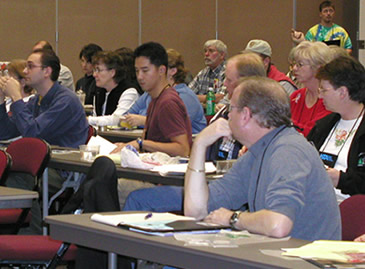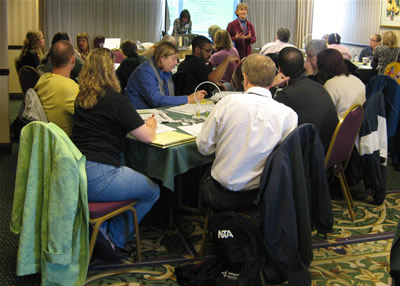 Getting to Know a School
Getting to Know a School
Below are some questions that you might ask the teacher when setting up a classroom
visit in order to get to know what the school is like and how the students are
typically exposed to new ideas and information in science class. This
can help you to format your class visit to suit the audience.
- How many students are in the class?
- Could you describe what students do during a typical science class?
- Are students currently engaged in science projects? If so, what types? Did they develop the project ideas themselves?
- Are students accustomed to lecture-style presentations? If so, what length works best?
- Are students accustomed to hands-on learning experiences in science class?
- Do students usually work in groups or on their own during science class?
- Is your science curriculum integrated with other subjects?
For more information:
Different Types of Schools
The information about various K-12 schools in the United States below is intended to provide a brief overview of various types of schools that might be interested in having a scientist come for a classroom visit.
- Elementary schools: generally grades K-5 (ages 5-11). Usually, the same teacher is responsible for teaching all subjects except physical education, and occasionally music and/or art.
- Middle Schools: generally grades 6-8 (ages 11-14), but can exclude 6th grade and may include 9th grade. Larger middle schools are often organized into teams of 100 or more students and four teachers (math, English, science, and social studies). The science teacher holds several classes each day for groups of these students. Subjects taught in middle school science classes vary but typical subjects include Earth science, biology, and physical science.
- High Schools: generally grades 9-12 (ages 14-18). In some cases it includes grades 8, or excludes grade 9. In larger high schools with several science teachers, each teaches a particular branch of science (such as biology, chemistry, Earth science, and physics), and likely teaches several classes a day of the same subject, and potentially an advanced class as well. In smaller high schools, the science teacher is often responsible for teaching all science subjects.
- Charter schools: innovative public schools started by parents, teachers, community organizations, and companies. Charter schools often vary in teaching methods and focus. For more information: U.S. Charter Schools Organization
- Magnet Schools: highly competitive public schools that tend to have specialized programs in subjects such as art or science, for example.
- Montessori schools: students engage in spontaneous, meaningful activities under the guidance of educators trained in the Montessori philosophy. The students progress at their own pace, according to their own capabilities. For more information: International Montessori Council
- Waldorf schools: based on a developmental approach that addresses the needs of the growing child and maturing adolescent, to educate the whole child. For more information: Association of Waldorf Schools of North America
- Private schools: there are a large variety of private schools including secular (non-religious), religious schools, and schools with different teaching philosophies such as expeditionary learning schools. For more information: National Association of Independent Schools
Resources:
- Scientists in Schools Home
- About Scientists in Schools
- Getting to Know a School
- Definitions of Common Educational Terms
- Checklist for a School Visit
- Working with K-12 Students
- Science Topics for Students of Different Ages
- Making a Lesson Plan
- Recommended Resources









